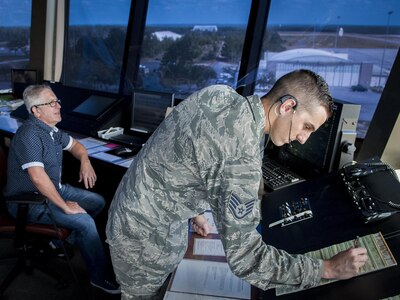By Samuel King Eglin Air Force Base
DUKE FIELD, Fla., Nov. 1, 2017 — At the top of the air
traffic control tower here, F-35 Lightning IIs zip by at eye level. Air Force
Staff Sgt. Brian Morris keys up his headset to tell those fighters where to go,
when to turn and who to talk to next. A few steps behind Morris is Steven
Kates. He monitors the action throughout the tower and keeps a keen eye out
across the 360-degree spectrum of the bright blue yonder.
Morris is an air traffic controller with the 96th Operations
Group. He’s new to the tower here and its ATC flight, and completed his
qualification in the three controller positions -- flight data, ground and
local -- here Oct. 4. This means he can control aircraft on his own, without
being monitored by a trainer. Some of his training was conducted by Kates, the
tower’s watch supervisor.
During Morris’s training, the trainee and his trainer
discovered they shared a generational ATC bond, possibly dating to before the
new staff sergeant was born.
“We were basically getting to know the new guy on the crew,”
said Kates, who has controlled aircraft at Eglin and Duke Field for 20 years.
“We discovered his father and myself were at Davis Monthan [Air Force Base, Arizona]
tower at the same time in the early nineties.”
Like Father, Like Son
Kates remembered training and supervising Morris’s father in
the tower between 1990 and 1992. Kates was a technical sergeant and Brian
Morris Sr., was an airman first class.
“It took a bit, but my dad did remember a Sergeant Kates,”
said Morris, who followed in his father’s footsteps to become an Air Force air
traffic controller.
Kates joked about possibly seeing Morris as an infant at
unit events or family functions. Morris, who was born in 1991, went even
further, speculating that Kates may have signed his father’s leave paperwork so
he could be at his son’s birth.
Right now however, Kates looks on as Morris issues a bird
sighting to an incoming F-35 during his final tower evaluation. Kates helped
both father and son become qualified air traffic controllers approximately 26
years apart.
Morris is one of a few new airmen assigned to the 96th
Operations Group flight to help with the increased traffic above the Duke Field
runway.
The 14 airmen and civilians on the day and night crews
control aircraft from every base in the local area, to include Tyndall Air
Force Base and Pensacola Air Station. This means a continuous rotation of all
varieties of aircraft from helicopters to the F-22 Raptor. The bulk of their
traffic is F-35s and Air Force Special Operations Command aircraft.
Something New Every Day
The demand for runway approaches at Duke Field challenges
new controllers and keeps veteran controllers on their toes. Recently, Runway
18/36 has become the go-to path for unique training opportunities. The
controllers work all requests for nonstandard approaches, atypical special
operations landings, parachute drop training and night vision flights.
“It is something new every day we come to work,” said Kates,
a retired master sergeant and Texas native. “The constant changes make it
challenging and overall very satisfying work.”
He compared controlling aircraft to a 3-D chess board.
Kates also said when training a new controller he always
tries to impart some wisdom from his years of experience that could benefit the
trainee in his current position and possibly throughout their career.
“He really helped me grasp how different Duke Field traffic
is from Eglin,” said Morris, who is now qualified at both locations. “He made
me understand how the puzzle fits together.”
Kates estimates he’s trained more than 40 controllers over
his 37-year career. He only has five more years before he can retire and he
said he plans to keep sharing his knowledge and techniques until he finally
hangs up his headset.
Morris has two more years in the Air Force and plans to
again follow his father’s path and become an air traffic controller for the
Federal Aviation Administration.

No comments:
Post a Comment